INTRODUCTION
ECSA offered a range of accessible voting options to ensure that every eligible elector was supported in casting their vote. These voting options included:
- Postal voting
- Pre-poll voting
- Voting at declared institutions
- Interstate voting
- Overseas voting
- Remote voting
- Voting on polling day
The share of votes issued for each voting method offered at the 2018 State Election is shown in the graph below.
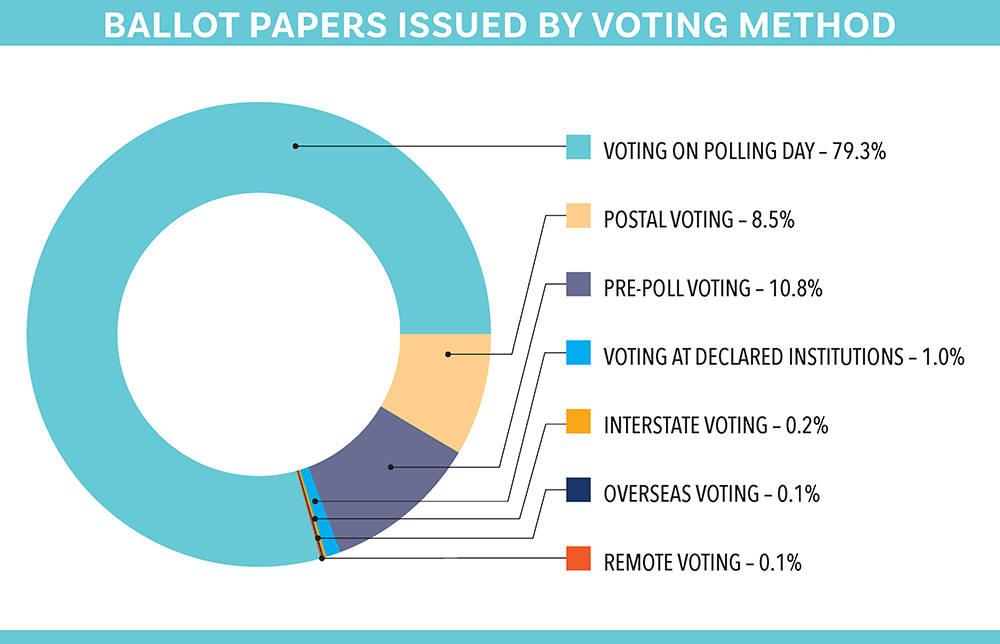
PARTICIPATION
Turnout or participation measures the percentage of enrolled voters who cast a vote (formal or informal) which is accepted for scrutiny. As is customary, it does not include rejected votes or postal votes returned after the legislated deadline.
The participation rate in 2018 decreased to 91.1% for the Legislative Council, down from 92.1% at the 2014 State Election, and decreased to 91.0% for the House of Assembly from 91.9% in 2014. These are the lowest participation rates for a State Election since World War II and a reflection of a slow but steady decline in electoral turnout across recent elections. Declining participation is a trend across Australia and most democratic countries. In 2018, the growth of the electoral roll as a consequence of the federal direct enrolment program and a surge in enrolments for the 2017 Australian Marriage Law Postal Survey, may to some extent have negatively affected the turnout rate through the addition to the roll of electors who had previously avoided enrolling and did not wish to vote.
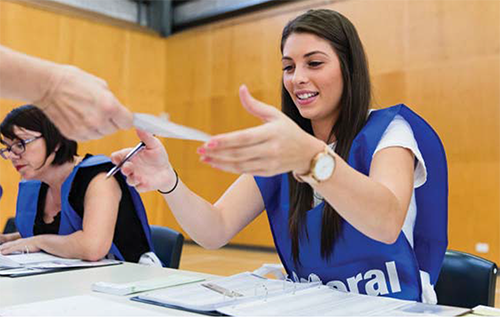
At the same time, there was an increase in the number of ballot papers cast at this election, with almost 43,000 more South Australians turning out to vote in 2018 than four years previously. Although there may seem to be a contradiction between the falling participation rate and the increase in the number of ballots cast, this increase occurs at every election and is the natural effect of population growth on voter numbers from one election to the next.
Older South Australians turned out to vote in force at the election, particularly electors aged 65 and over, almost all of whom voted (98.4%). By contrast, participation was lowest among young electors. The low turnout rate among 18 to 24-year-olds (76.2%) and 25 to 34-year-olds (84.0%) reinforces the need for a new voter education program and improved awareness campaign.
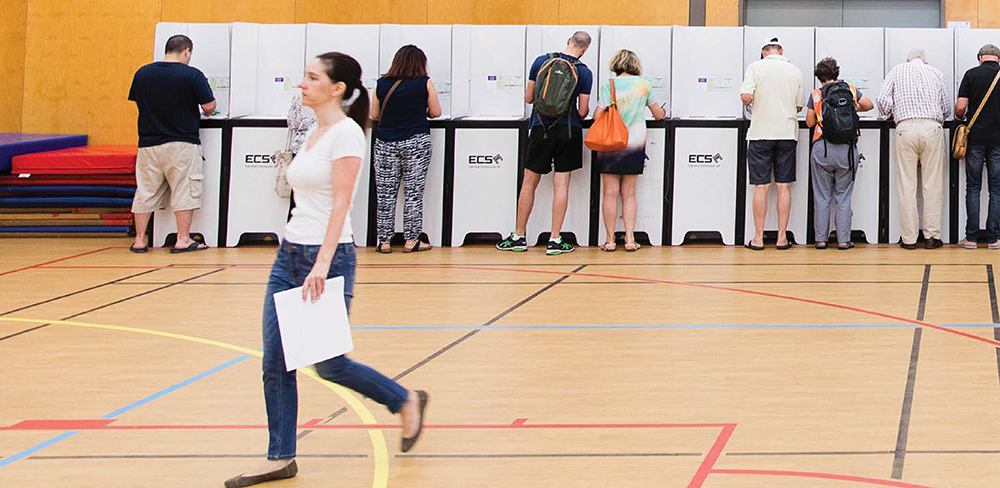

Voter turnout was highest across a large part of country South Australia as well as the Adelaide Hills and some of the outer-southern metropolitan areas. As in 2014, Schubert had the highest participation rate in the state (94.3%), followed on this occasion by Heysen (93.7%) and Narungga (93.6%). Giles was again the district with the lowest turnout (86.0%), followed closely by Elizabeth (86.6%) and Taylor (86.7%).
Low turnout was concentrated in districts with three different profiles: inner urban districts that have young and mobile populations (Adelaide); districts that have high proportions of residents who are not proficient in English (Croydon, Enfield and Taylor), and districts with a degree of socioeconomic disadvantage (Elizabeth and Giles).

POSTAL VOTING
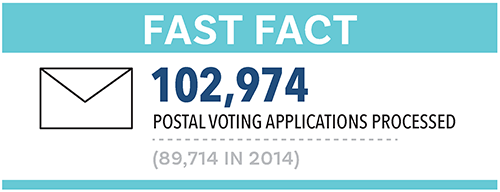
There were 20,734 voting packs posted out to electors on the register of declaration voters – a register of electors who are permanently unable to attend a polling booth at election time.
This Election highlighted a number of serious issues affecting the ongoing viability of postal voting as a voting service which are covered in the following pages. There is widespread concern across all Australian electoral commissions that the changes to Australia Post’s business model have challenged the reliability of postal voting as a voting method, especially for electors located in rural, interstate and overseas destinations. Longer delivery times for letters, the abolition of Saturday deliveries, and the reduction in the number of weekly deliveries particularly in regional and rural areas all increase the likelihood that a postal application or postal vote may be rejected due to it arriving after the legislated cut-off dates (namely the Thursday prior to polling day for applications and the Saturday after polling day for returned ballot papers).

INFORMATION TO ELECTORS THAT CAUSED CONFUSION
In the lead-up to the Election the Liberal Party
distributed material to electors via mail, a dedicated
website and on social media, requesting their
personal details in order to send them early voting
information and postal vote application forms.
This caused confusion among many electors who
mistakenly perceived it to be official material from
ECSA. In response to a number of complaints and
media coverage, ECSA issued a press release to
inform the public that it had not issued the material.
In addition to creating significant confusion among
electors, these actions resulted in some South
Australians being disenfranchised due to a belief that
by responding to the material they were applying to
ECSA for a postal vote. This is evidenced by a number
of electors who, in response to a failure to vote
notice, claimed that they believed they had applied
for a postal vote by replying to the Liberal Partyissued
material.
While not contravening the Act, these actions caused
confusion and disenfranchisement. Consideration
must be given to prohibiting political participants
from any involvement in the postal voting process.
A CALL FOR LEGISLATIVE CHANGE: REMOVING SIGNATURE REQUIREMENTS FOR POSTAL VOTE APPLICATIONS
ECSA was the only electoral commission in Australia not to offer electors the option of applying for a postal vote online at its most recent election. The reason why ECSA has never offered online (or telephone) applications for postal votes is the legislative requirement followed for over a century across Australia obliging Returning Officers to compare the signature on the postal application with the signature on the envelope containing the postal ballot papers. In recent years every jurisdiction other than South Australia has updated their legislation to allow types of postal applications that do not contain a signature.ECSA is aware of significant public expectations for government agencies to offer online services and also recognises the significant printing and postage costs involved in the paper-based postal vote application process. More crucially, as ECSA observed in 2018, with the decline in the timeliness of the postal service, significant numbers of postal applications were rejected and electors disenfranchised due to late arrivals of applications.
ECSA seeks legislative change to allow electors to apply for postal votes online and by telephone. Crown legal advice obtained since the 2018 State Election informed ECSA that the provisions of the Electronic Communications Act (2000) may be applied to the requirements for signatures within the Act, meaning that ECSA could already accept electronic applications for postal votes without pen-and-ink signatures. However, to avoid any uncertainty and to allow telephone applications ECSA requests that Parliament remove the requirement for postal vote applications to bear the signature of the elector, replacing it with a robust verification process to be determined by the Electoral Commissioner. This discretion to determine what verification system ECSA uses is important to allow ECSA the ability to adapt and evolve its processes to changes in technology as they occur, without having to return again to Parliament.
Recommendation 6.
That the Act be amended to remove the requirement for postal vote applications to be by letter and to bear the signature of the elector, so that a secure method can be implemented to allow electors to apply for postal votes online and by telephone with a form of identification that can ensure the validity of the returned votes.
A CALL FOR LEGISLATIVE CHANGE: POSTAL VOTING TIMEFRAMES
Postal voting at the 2018 State Election was affected by a number of issues that highlighted the unsuitability of the legislated deadlines for applying for and returning postal votes, currently 5pm on the Thursday two days prior to polling day for the former, and 6pm on the Saturday after polling day for the latter. These issues included:- 1,823 postal vote applications which arrived after the deadline and consequently could not be processed. No ballots were sent out to these electors and it was not possible to advise them in time for polling day to make other arrangements to vote.
- 1,232 postal ballots which arrived after the deadline for the return of completed postal votes. These votes could not be processed and hence did not count in the Election.
The deadlines themselves are vestiges of a bygone era. The two-day deadline to apply for a postal vote dates back to the birth of the current Act in 1985, while the seven-day deadline to return a postal vote has remained unchanged since 1955.
It is clear from Australia Post’s current delivery times that the two-day deadline to apply for a postal vote is too late to ensure ballot papers reach anyone other than metropolitan Adelaide electors in time to vote at the election.
After carefully considering the different solutions available, ECSA requests that Parliament move the deadline to apply for a postal vote. Two factors need to be considered here: Australia Post’s delivery times; and the interruption to postal services provided by the Adelaide Cup public holiday on the Monday prior to polling day. In light of these factors, ECSA recommends to Parliament that the only viable dates are those detailed in the Recommendation below.
Even with these revised timeframes, overseas deliveries are still unlikely to arrive in time. For this reason, ECSA recommends most overseas postal votes be replaced by the solution proposed in Recommendation 8.
That the Act be amended to modify the timeframes for postal voting, bringing forward the deadline to apply for a postal vote from 5pm on the Thursday prior to polling day to:
- 5pm on the Tuesday prior to polling day for applications from South Australian locations; and
- 5pm on the Friday eight days prior to polling day for applications from interstate and overseas locations.
A CALL FOR LEGISLATIVE CHANGE: ELECTRONIC POSTAL VOTING FOR OVERSEAS AND REMOTE VOTERS
Of the 712 postal voting packs ECSA mailed overseas at the 2018 State Election, only 48 votes (6.7%) arrived back in time to be counted.The estimated delivery times for Australia Post’s standard international airmail service are not compatible with the calendar for postal voting in South Australia. These currently range from eight business days to London to 13 business days to Beijing, with an additional two business days for any address outside major metropolitan areas.
However, even using a much pricier express service to dispatch and return a postal vote from both ends, it is impossible to guarantee that a postal vote can make it across the world and back between the date ballot papers are printed and the deadline for votes to be received. This has been proven through the experiences of other electoral commissions, such as the NT Electoral Commission which in 2016 used Australia Post’s International Express service but only received 20.6% of its overseas votes back in time to be counted.
Electoral commissions around Australia recognise that long distance postal voting has increasingly become unfeasible and is failing to meet the needs of the large numbers of Australians travelling or residing overseas. ECSA shares the view of other commissions that a viable electronic solution is needed to replace long distance postal voting, not only for overseas electors but for those in similar circumstances in non-metropolitan interstate locations, as well as remote locations of South Australia.
Following assessment of the electronic solutions used in other jurisdictions, ECSA advocates a secure system for the electronic delivery and return of ballot papers at state elections modelled closely on the system used in New Zealand.
Under the New Zealand system, at election time electors overseas apply for and download their ballot papers from a secure website. After printing their ballot papers and then voting, electors must scan or photograph them and then upload the images back into the system. The electronic system enabling this process built by the NZ Electoral Commission prior to the 2014 general election, is subjected to rigorous independent security testing and accreditation before each electoral event. Since launching in 2014, this has become the preferred voting method for NZ voters overseas, with ‘electronic postal votes’ rising from 22,333 in 2014 (56% of overseas votes) to 41,221 in 2017 (67% of overseas votes). Although it continued to offer a traditional postal option in 2014 and 2017, after the 2017 general election the NZ Electoral Commission recommended to parliament that this option be removed for future elections on account of the rising number of postal votes arriving too late to be counted.
ECSA recommends South Australia learn from this experience and move directly to an electronic-only option for electors located overseas, making it optional for electors in non-metropolitan interstate locations, as well as remote intrastate locations.
ECSA does not advocate internet voting or the use of email to return ballot papers until the risks associated with voter privacy and IT security have been fully addressed and a national system implemented.
That the Act be amended to allow ECSA to replace long-distance postal voting for electors overseas, in non-metropolitan interstate locations, as well as remote locations of South Australia, with a robust and secure system for the electronic delivery and return of ballot papers. Should this recommendation be agreed Recommendation 7(ii) would not be required.
A CALL FOR LEGISLATIVE CHANGE: POSTAL VOTING FOR PRISONERS
Voting at state elections is compulsory for all South Australian electors, including residents of correctional facilities. It is the Electoral Commissioner’s responsibility to ensure all electors have the opportunity to exercise their democratic right to vote at elections.Prior to 2018, the only legally available method for prisoners to vote was for the Electoral Commissioner to declare a prison to be a declared institution and have electoral officers visit it and issue declaration votes under section 83 of the Act.
Significant problems can arise with attempting to send electoral visitor teams into correctional facilities. During operational situations, electoral officers can be denied entry into prisons or be required to leave. Occasions have arisen at the past three state elections where electoral officers have been unable to enter a prison, or there has been insufficient time to take all votes. Additionally, at each state election staff have raised concerns about their personal safety visiting these facilities.
Commonwealth legislation provides that at federal elections prisoners can vote by post or a mobile team can visit the prison and take votes. During the 2016 federal election, all South Australian prisons requested prisoners vote by post. The same is planned for the next federal election.
In November 2017, the Electoral Commissioner requested that the then-Attorney General consider making a regulation to enable imprisonment to be considered a ‘reason of a prescribed nature’ as provided for under section 71(2)(b)(vii) of the Act to allow ECSA to provide postal vote applications to prisoners in correctional facilities instead of visiting them as a declared institution. This request was agreed to and a regulation made, however, this was limited to the state’s three maximum security facilities.
ECSA prefers to be able to provide postal vote applications to all eligible prisoners and hence requests that imprisonment be considered a ‘reason of a prescribed nature’ as provided for under section 71(2)(b)(vii). This measure has the support of the Chief Executive of the Department for Correctional Services.
That the Regulations be amended so that a reason of a prescribed nature allows a resident of any correctional institution to make a declaration vote by post.
REGISTERED DECLARATION VOTERS
Electors who are unable to attend a polling booth
at election time and meet certain criteria are
eligible for registration as registered declaration
voters for state elections and general postal voters
for federal elections. Once registered, voters do
not need to re-apply for future elections and,
providing their circumstances do not change, will
automatically receive a postal vote for each state
and federal election.
The number of electors on the register of declaration
voters has increased by more than 85% over the
past two state elections, from 11,917 in 2010 to
20,734 in 2018. Silent electors account for almost
half of the total number, while 7,926 or 36% live with
a disability or are carers.
A CALL FOR LEGISLATIVE CHANGE: HARMONISING THE REGISTER OF DECLARATION VOTERS
The register of declaration voters is an increasingly popular option for electors who are permanently prevented from attending a polling booth on polling day due to living with a disability, being a carer for someone who is seriously ill or infirm, living in a nursing home, religious beliefs or one of several other criteria.ECSA is aware that the number of South Australians aged 65 and over is projected to increase significantly over the next decade, which will create a corresponding increase in the number of electors who may be eligible for and would benefit from becoming a registered declaration voter.
The register of declaration voters is managed by the Australian Electoral Commission (AEC), and South Australian electors who wish to apply to be registered are required to do so via the AEC website. ECSA is aware that electors have experienced confusion resulting from the different terminology used by the AEC, with the more intuitive term ‘general postal voter’ prescribed in the Commonwealth Electoral Act. Furthermore, certain criteria on the AEC’s application form are limited to federal elections only, namely those relating to voters serving a prison sentence of less than three years or those who are defence or Australian Federal Police employees serving overseas. ECSA is not aware of any reason why South Australia should not allow electors in these categories to apply to be on South Australia’s register.
To better support South Australian voters, ECSA believes that South Australia should amend its legislation to follow the example of other jurisdictions around Australia and change the name of its registered declaration voter program to ‘general postal voter’ program, and also harmonise the list of eligibility criteria with Commonwealth criteria.
That the Act be amended to change the name ‘registered declaration voter’ to ‘general postal voter’ and to harmonise the eligibility criteria of the registered declaration voter program with the criteria of the Commonwealth general postal voter program.
PRE-POLL VOTING
Pre-poll voting proved to be extraordinarily popular in 2018 with 120,468 votes issued, representing an increase of 241% since the 2010 State Election.
In its pre-2018 election planning ECSA anticipated an increase of 30% in the number of pre-poll votes that would be cast (around 105,000) and staffed accordingly. The actual increase of 50% resulted in additional pressure on staff and in some instances longer-than-anticipated queues and wait times at some pre-poll voting centres. Pre-poll waiting times also result in part from the fact that pre-poll votes are declaration votes which take much longer to issue and process, leading to longer queues at pre-poll centres.
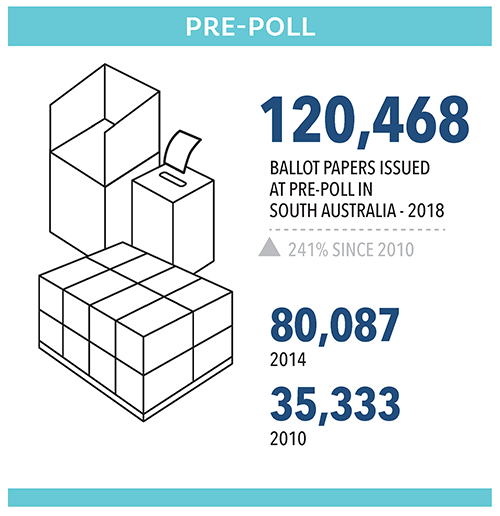
The growing public demand for pre-poll voting is apparent right across Australasia, as evidenced in the following table showing pre-poll votes as a share of all votes taken at the three most recent elections in each jurisdiction:

Over the past five years, ECSA’s counterparts in other jurisdictions have all made changes to accommodate this rising demand. It is clear that the work commitments, mobility, changing lifestyles and expectations of South Australian electors are no different to those of electors living elsewhere in Australia and ECSA considers it is inevitable the popularity of pre-poll voting will continue to increase with future elections.
With the declining number of young people voting, there is a risk that not embracing pre-poll voting could frustrate and disenfranchise electors who expect convenient voting options. To cater for this major change in voter behaviour and expectations, ECSA believes several changes are required before the next state election, as outlined in the following pages.
A CALL FOR LEGISLATIVE CHANGE: ELIGIBILITY CRITERIA FOR PRE-POLL VOTING
Pre-poll voting has seen a surge in popularity in recent years in South Australia and across Australasia. To meet this growing demand, electoral commissions in other jurisdictions have greatly expanded their pre-poll voting services.ECSA recognises that in addition to changing demands on people’s time on Saturdays, public expectations about voting have profoundly changed. Research has shown that electors want convenient options that allow them to fulfil their democratic duty and obligations under compulsory voting.
Key to this expansion of convenience voting is the removal of eligibility requirements for pre-poll voting. Four Australian jurisdictions (NT, Queensland, Victoria and WA) have removed pre-poll eligibility requirements in the past decade, while the ACT government is currently considering removing its requirements. ECSA’s 2018 Electors Surveys show broad support for removing pre-poll eligibility requirements in South Australia, with 58% of prepoll voters stating that people should not have to provide a valid reason to vote early.
Another important reason to remove eligibility requirements is ECSA’s inability to enforce compliance. As progressively more people vote early, the eligibility test has become problematic. The reality is that polling officials cannot test voters’ claims to be travelling or caring for an ill family member, and must simply accept them at face value.
Given the indisputable rise in demand for prepoll voting, mirroring national and international trends, the public’s support for removing eligibility requirements and the impracticality of enforcing compliance, ECSA recommends legislative change to remove the eligibility criteria for pre-poll voting in South Australia.
Recommendation 11.
That the Act be amended to remove eligibility criteria for pre-poll voting to allow any enrolled elector to opt for convenience voting at a pre-poll voting centre in the fortnight prior to polling day.
A CALL FOR LEGISLATIVE CHANGE: ENCOURAGEMENT OF VOTING ON POLLING DAY
In 2017, the government inserted into section 8 of the Act the requirement for the Electoral Commissioner to, “… promote and encourage the casting of votes at a polling booth on polling day.” At the time, the then-Attorney General stated in his second reading speech that the intention of this legislation was to “discourage pre-poll voting for convenience” and “curb the increase in pre-poll voting”. No other jurisdiction places this obligation on its Electoral Commissioner and ECSA recommends it be removed from the Act.Recommendation 12.
That the Act be amended to remove the direction for the Electoral Commissioner to encourage the casting of votes at a polling booth on polling day.
MODERNISING ELECTORAL SERVICES : EXPANDING PRE-POLL CAPACITY
To meet the growing public demand for pre-poll voting most electoral commissions around Australia have opened greater numbers of pre-poll centres. They also offer pre-poll voting on the Saturday prior to their polling days and extend opening hours to cater to electors who work.Despite legislative attempts to hold back the growth of convenience voting in South Australia, the surge in demand for pre-poll voting and complaints about prepoll queues and opening hours have shown that electors expect voting services that are more flexible in meeting their needs.
ECSA recognises this and considers it appropriate to accommodate the growing demand for pre-poll voting at future elections by significantly expanding our pre-poll capacity, establishing a much greater number of pre-poll voting centres equipped with more issuing points and more staff. ECSA will also cater for electors who cannot vote during business hours by expanding opening hours and opening on the Saturday prior to polling day.
A CALL FOR LEGISLATIVE CHANGE: ISSUING ORDINARY VOTES AT PRE-POLL VOTING CENTRES
The community expectation for votes to be counted and results announced promptly is challenged by the rise of convenience voting. All votes not cast on polling day are currently issued as declaration votes which cannot be counted until the week after polling day once rolls have been scanned and declaration envelopes transferred to each Returning Officer. As the number of declaration votes increases, the more likely it becomes that results in close elections will not be known for several days.Casting a declaration vote is also complex and time-consuming for voters. Declaration votes take much longer to issue than ordinary votes and each voter needs to complete a declaration, which can be challenging for voters with literacy issues.
The status quo approach to pre-poll vote issuing and counting is no longer sustainable, with ever increasing numbers of declaration votes impacting on the speed of both the vote and the count. Unless action is taken, queues will be longer and election results delayed, creating frustration for candidates and voters, as well as criticism of ECSA.
A number of jurisdictions – the Commonwealth, NZ, the ACT, NT, Tasmania and Victoria - have resolved this problem by issuing the majority of pre-poll votes as ordinary votes and then counting these on polling day. ECSA recommends this approach be adopted in South Australia.
ECSA proposes to issue ordinary votes at pre-poll centres to all electors from the electoral district where the centre is located. Together with the greater number of pre-poll centres that will be established at future elections, this will ensure that the majority of pre-poll votes are issued as ordinary votes which can be counted sooner and faster. Electronic roll mark-off will ensure there is no associated risk of multiple voting.
This call for legislative change is closely associated with another Read more for all ordinary votes to be counted on polling day. Together these changes will ensure that a much greater proportion of the results are known on election night.
That the Act be amended so that ordinary votes may be issued at pre-poll voting centres located within the elector’s own district.
INTERSTATE VOTING
ECSA worked in partnership with all other Australian
state and territory electoral commissions under a
reciprocal partnership agreement to offer in-person
voting services for South Australians visiting other
states and territories during the election period.
There were eight pre-poll locations interstate, the
same as the previous two state elections.
In 2018 a total of 2,119 votes were issued at interstate
locations, 576 more votes than in 2014.
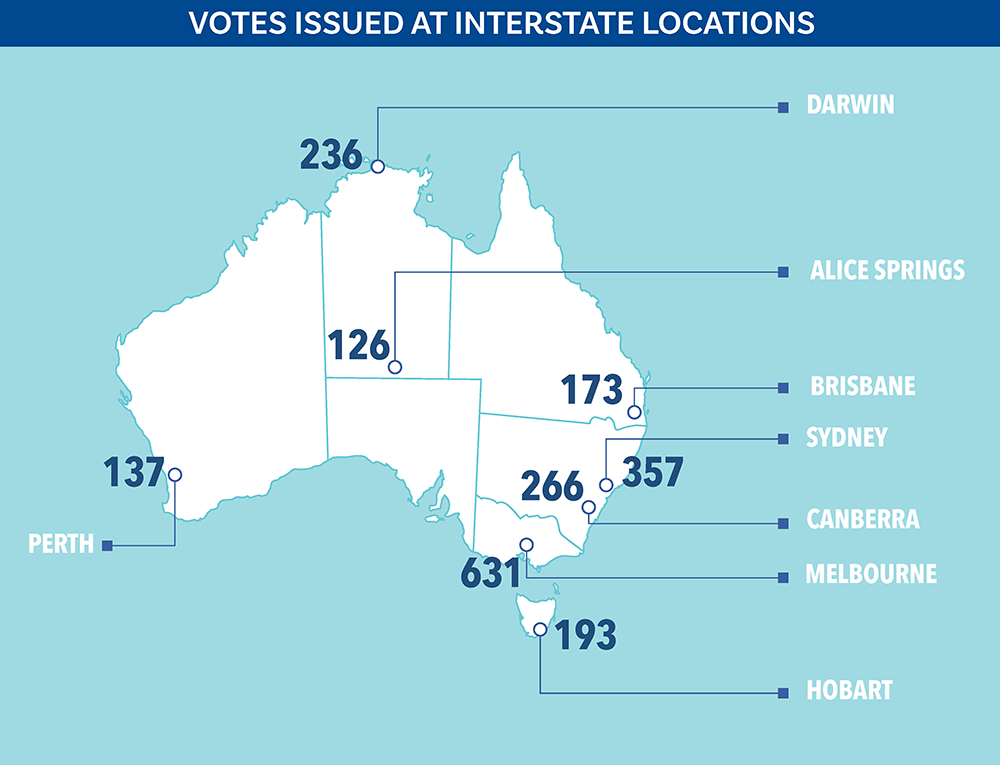
OVERSEAS VOTING
At the 2018 State Election, ECSA worked with the Department of Foreign Affairs and Trade and the New Zealand Electoral Commission to offer pre-poll voting services at seven overseas locations. These overseas locations issued a total of 616 votes, compared to five locations at the 2014 State Election which issued 390 votes.
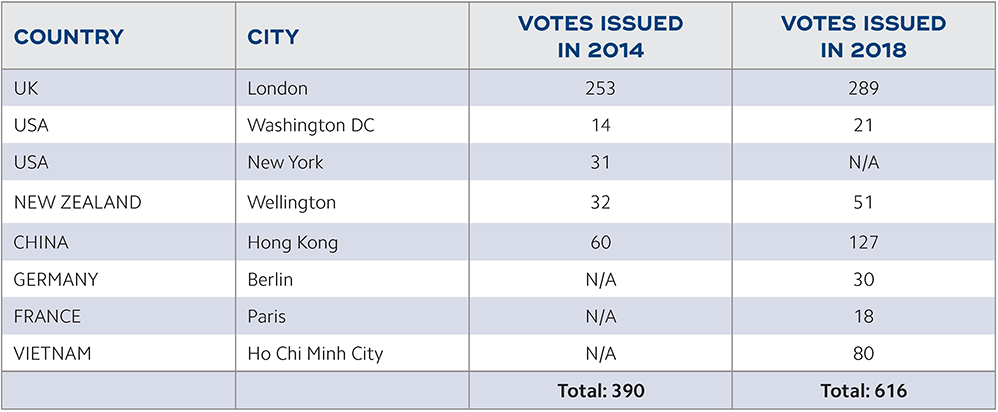
The selection of overseas locations in 2018 was based on consideration of the number of votes issued at those locations at the 2014 State Election, along with data shared by the AEC for votes cast by South Australian voters at overseas locations during the 2016 federal election. A request to establish a voting centre at the Australian consulate in New York in 2018 was declined due to the consulate’s limited staffing capacity. The Hong Kong consulate only agreed to issue votes in the second week of pre-poll in 2018 due to their staff’s perception of low numbers at previous elections.
MODERNISING ELECTORAL SERVICES : AN END TO OVERSEAS PRE-POLL VOTING CENTRES
Although ECSA has a responsibility to enfranchise as many overseas South Australians as possible, overseas pre-poll voting in 2018 was overly expensive and logistically challenging. Despite our staff’s best efforts, it proved difficult - and in one case impossible - for voting materials to be delivered overseas in time for the beginning of voting and returned to ECSA in time to be included in the count.The key problem with offering pre-poll voting at such a small number of overseas locations however, is that it caters to just a tiny fraction of the tens of thousands of South Australians living or travelling abroad. For this reason, from the 2022 State Election onwards, ECSA plans to discontinue pre-poll voting at consulates overseas. Electors will instead be encouraged to make use of the electronic system for the delivery and return of ballot papers as proposed in Recommendation 8.
REMOTE POLLING
Remote polling is a key election service delivered by ECSA to South Australian electors living in remote locations in the state, including remote Aboriginal communities.
Remote polling has complex logistical requirements which require extensive forward planning to arrange mobile teams to offer voting across the electoral districts of Flinders, Mackillop, Chaffey, Stuart, Giles and Narungga.
In 2018, ECSA increased its mobile polling teams by 29% compared to 2014 with a 7% increase in the number of locations polled.
ECSA’s remote polling teams travelled more than 10,000 kilometres to 32 locations around SA over eight days in the fortnight before polling day to give remote electors their chance to vote. ECSA chartered aircraft to conduct polling in the far north and other remote locations with each location visited on a single day in the two weeks leading up to polling day.
The remote polling teams conducted a 34% increase in total hours of polling when compared to 2014 and there was a 10% increase in total votes taken across mobile polling locations over 2014.
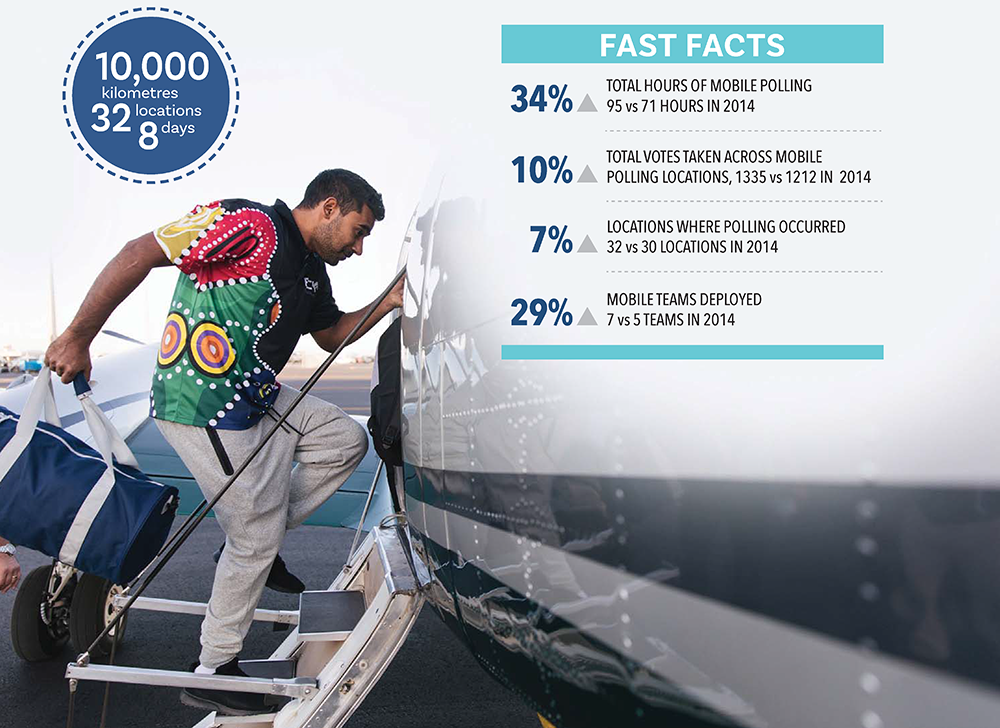
SPOTLIGHT : FOOTY LEGENDS TAKE CENTRE STAGE IN POLLING IN APY LANDS

Retired Aboriginal Aussie Rules footy legends Gavin Wanganeen and Michael O’Loughlin accompanied the ECSA mobile voting team to the tiny community on Sunday 10 March to hold a footy clinic with local kids and a barbecue for the community.
The pair usually trail a bunch of kids after them wherever they go in Aboriginal communities, with the kids wanting to kick the footy with their idols and get an autograph. Ernabella was no exception.
Wanganeen and O’Loughlin ran skill sessions and kick to kick, and handed out Swans and Port Adelaide jumpers for the clinic. By the time it was over, jumpers signed, and interviews done, around 200 adults had cast their votes in a makeshift polling booth at the local community store.
As O’Loughlin told an ABC Adelaide reporter and crew who accompanied ECSA on the visit, watching the elders vote was like being a youngster aspiring to be an AFL player.
“Gav and I watched our uncles play, we saw more Aboriginal people on television playing footy at the elite level, so it’s a bit like today – the kids see the elders vote, their mothers and fathers come in and vote, so it already plants that seed in their mind,” O’Loughlin said.
“Hopefully some of these young fellas will turn into community leaders.”
DECLARED INSTITUTIONS
These ‘declared institutions’ are typically aged care facilities, hospitals and correctional institutions. Once an institution has been declared, ECSA arranges for a team of electoral visitors to issue votes to residents at a mobile polling station located in situ at the facility or institution.
Electoral visits began in the week before polling day with teams of electoral officers issuing 10,717 votes across 269 declared institutions. Portable lookup devices allowed the officers access to the electoral roll to ensure the correct ballot papers were issued to electors.
As part of ECSA’s duty of care and focus on integrity and professionalism, all electoral visitors passed a working with vulnerable persons check and received training on working with the aged and people living with disabilities.
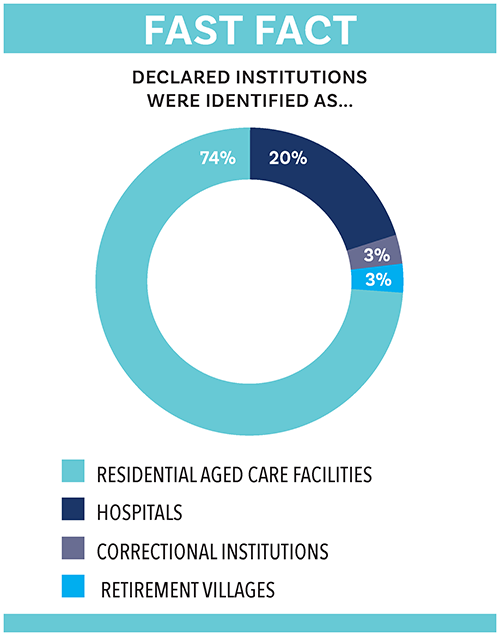
A CALL FOR LEGISLATIVE CHANGE: DECLARED INSTITUTIONS AND MOBILE POLLING
Almost a decade ago, in its Report on the conduct of the 2007 federal election, the Australian Parliament’s Joint Standing Committee on Electoral Matters (JSCEM) recommended that section 227 of the Commonwealth Electoral Act (CEA) relating to mobile polling be amended to remove all references to “remote divisions” and allow mobile polling at “... such locations and at such times as the Australian Electoral Commission deems necessary for the purposes of facilitating voting. For example, mobile polling ... should be able to be provided where there is likely to be sufficient demand for such facilities by homeless and itinerant electors, or in such other circumstances as warrant their use.” The Australian Government endorsed JSCEM’s two recommendations and successfully amended the CEA to open mobile polling up to all divisions and, as it explained in parliament, “... give the Electoral Commissioner flexibility rather than prescription ... the power to determine the places at which mobile polling can be conducted.”ECSA is of the view that adopting both of the above federal changes would be highly beneficial at state level in South Australia. Giving the Commissioner the flexibility to be able to determine other appropriate locations where teams of polling officials can go would allow ECSA to meet the special needs of sectors of the community by attending centres catering to homeless and itinerant electors (as well as others that ECSA’s stakeholder partners alert us to). The Australian and Victorian electoral commissions (Victorian legislation also provides its Commissioner with complete flexibility to determine where mobile voting teams can visit) have reported that in addition to allowing them to reaching electors in difficulty, this flexibility also permits them to use mobile polling as an appropriate strategy to service voting needs at, for example, major sporting events and community gatherings that can interfere with an election period.
To achieve this outcome, ECSA seeks the following changes to legislation:
- remove from section 77 of the Act all references to “places within a remote subdivision” to allow the Electoral Commissioner to establish mobile polling booths at any location in the state which he or she deems appropriate.
- abolish section 83 of the Act, thereby eliminating declared institutions and electoral visitors which will be replaced by the more generic mobile polling teams covered by section 77.
That the Act be amended to remove references to places within a remote subdivision to allow the Electoral Commissioner to establish mobile polling booths at any location in the state which he or she deems appropriate.
That the Act be amended to abolish section 83 concerning declared institutions and electoral visitors, which will be replaced instead by mobile polling teams able to visit and take votes at any location which the Electoral Commissioner deems appropriate.
SPOTLIGHT : VOTEASSIST
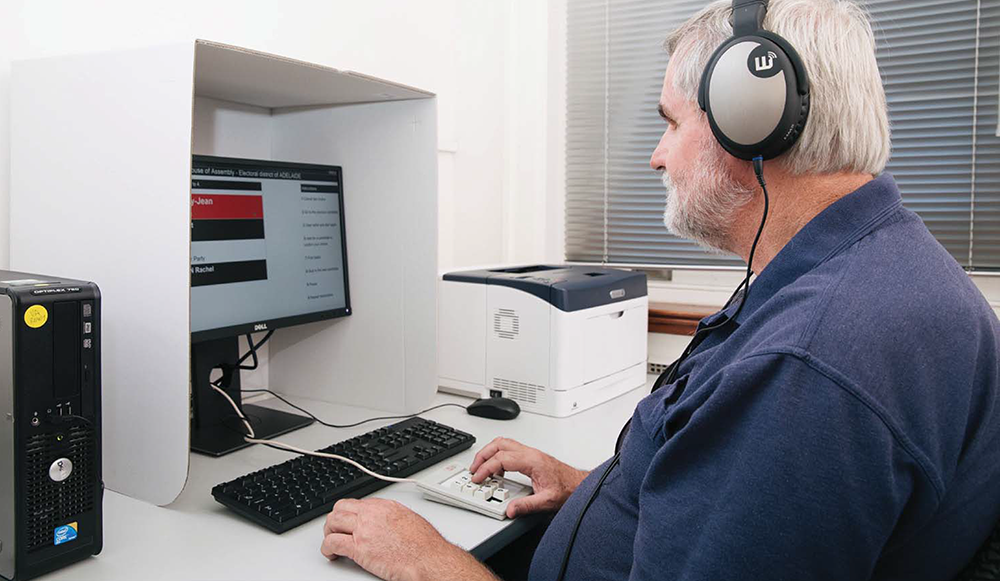
(ABOVE) MICHAEL CLIFFORD DEMONSTRATES THE USE OF VOTEASSIST AT THE RSB OFFICE IN PIRIE ST, ADELAIDE AFTER COMPLETING HIS OWN VOTE USING VOTEASSIST.
In June 2017, Parliament introduced amendments to the Act that allowed ECSA to offer electronicallyassisted voting for vision-impaired electors – amendments that ECSA had been advocating for since 2010.
Given the limited time available before the 2018 State Election, ECSA chose to implement an Adelaide-based trial of electronically-assisted voting software called VoteAssist, which had been successfully used at a previous Western Australian state election. VoteAssist uses specially-designed computer terminals coupled with headphones and a numeric keypad, with audio prompts guiding the elector through the voting process.
ECSA worked in partnership with the Royal Society for the Blind (RSB) to conduct the trial, with VoteAssist terminals located in four RSB locations across Adelaide in the two weeks leading up to polling day. RSB proposed the polling locations as they were familiar to vision-impaired electors while ECSA trained RSB staff as polling officials to administer the four polling locations.
In total, 100 vision-impaired electors used VoteAssist. Of the 64 users who participated in an anonymous survey, 96.8 per cent said they had a positive voting experience and 98.4 per cent said they would be keen to use a facility like VoteAssist at a future election.
ECSA strongly supports the provision of an independent and secret method of voting for vision-impaired South Australians and will continue to work in partnership with RSB and the sector to identify the best voting method for the visionimpaired at future state elections.
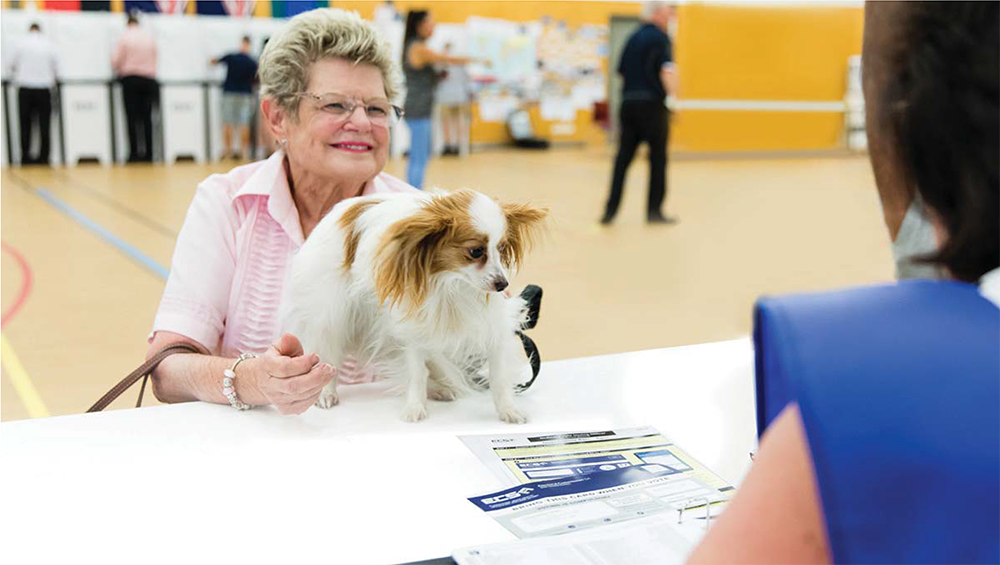
POLLING DAY
Polling booth locations were promoted through a range of methods, including the interactive map and polling booth finder on ECSA’s website, the EasyVote Card and App, as well as advertisements in newspapers, including a four-page spread in The Advertiser in the lead-up to polling day. The accessibility rating of all booths was included in all material.
Polling day for the 2018 State Election proved to be an overwhelming success, in no small part due to the dedication and professionalism demonstrated by election officers as well as the intensive planning undertaken by ECSA over many months. One common perception of Australian elections is lengthy waiting times, which proved not to be the case on 17 March with an average waiting time of just 6.1 minutes according to ECSA’s Electors Surveys.
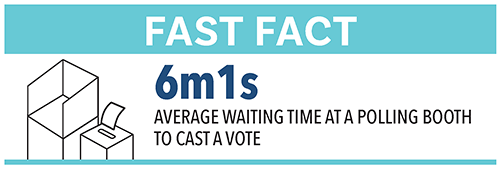
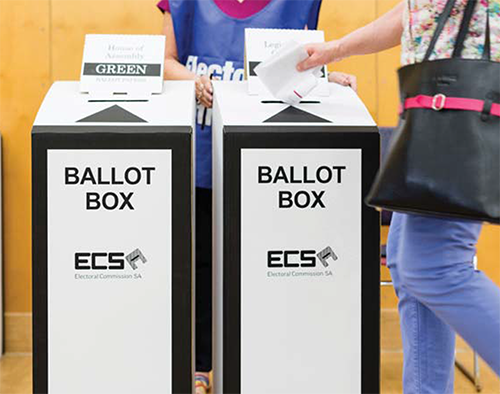
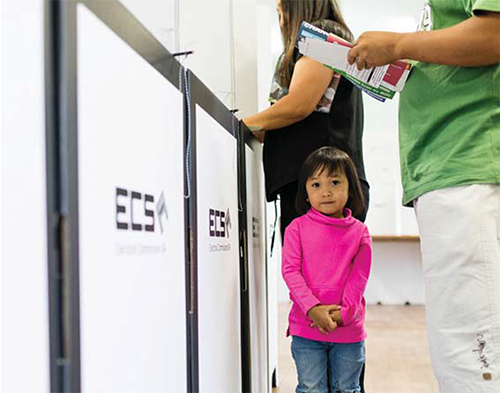
MODERNISING ELECTORAL SERVICES : ELECTRONIC ROLL MARK-OFF AND BALLOT PAPER PRINT ON DEMAND
While internet-connected technology has transformed how South Australians conduct most basic business transactions, the voting process at elections has remained largely unchanged for decades. Voters wait in a line to have their name manually crossed off a printed paper list, just as they have at every South Australian election since 1858. Sometimes they may need to wait to fill out a form in detail and by hand. They will then receive paper ballots, which they must mark by hand and place in a cardboard box to be counted manually. Voting has, in effect, become unlike any other transactional process that the public is used to in their daily lives.ECSA has identified two technological solutions which it is considering for the 2022 State Election to modernise and streamline the voting experience:
- full electronic roll mark-off technology linked to scanners that read barcodes placed on EasyVote Cards and within the EasyVote App.
- printing House of Assembly ballot papers at each issuing point of pre-poll centres and at a small number of polling booths on polling day.
Several electoral commissions around Australia have made the move to full electronic roll mark-off, including the ACT, NT, Queensland and Tasmania, while every other commission is currently working to introduce it at their future elections. At the 2017 Queensland State Election, the Queensland Electoral Commission also printed ballot papers on demand at every polling place across the state. The benefits of these approaches include:
- speeding up the voter identification process and significantly reducing queue times
- facilitating mark-off of voters with unusual names, particularly from Aboriginal and Torres Strait Islander and CALD backgrounds
- reducing the incidence of polling official error and subsequent erroneous issuing of nonvoter notices
- reducing the incidence of and potential for multiple voting, through instant alerts.
- allowing real-time monitoring of ballot paper stocks and allowing election workers to cater for unanticipated demand at a polling place by printing ballot papers as required
- reducing costs and environmental wastage resulting from the longstanding approach of printing excess quantities of all 47 House of Assembly ballot papers to cater for those who vote out of district.
Electronic mark-off has been successfully trialled by ECSA at previous by-elections in 2012 and ECSA hopes to make it available at all polling places at the next State Election, along with print on demand House of Assembly ballot papers in pre-poll voting centres provided that an appropriate level of financial support is made available.
ECSA recognises that securing the required quantities of hardware to introduce these innovations may involve significant costs. ECSA will need to secure the necessary funds to ensure that South Australia keeps pace with other jurisdictions and continues to meet community expectations.